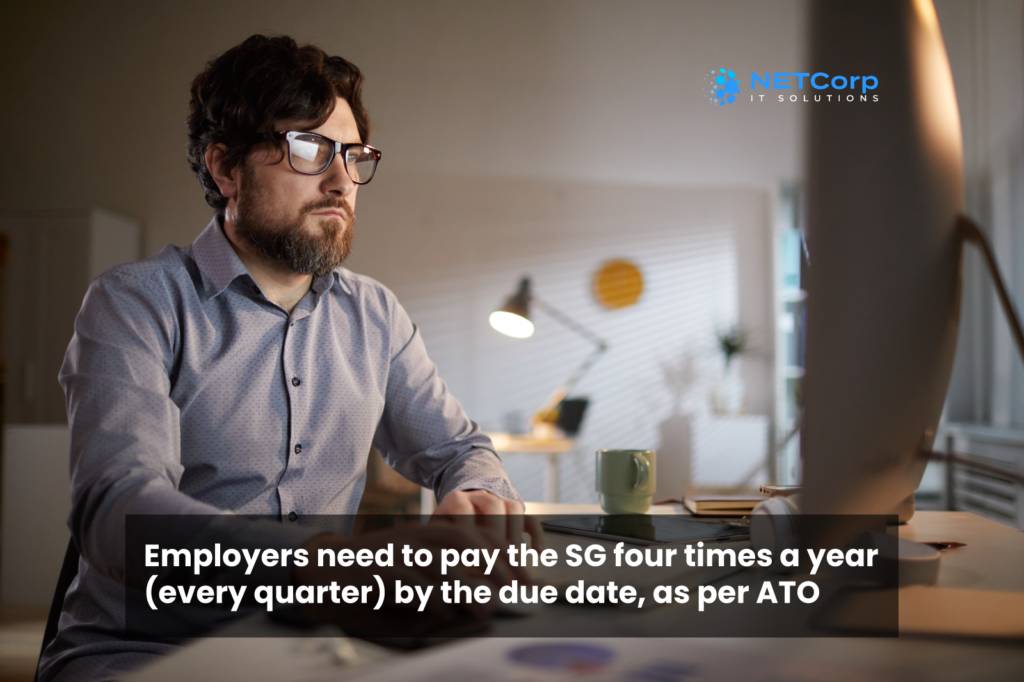Learn easy ways to manage Super Guarantee payments to avoid paying Super Guarantee Charges.
Missed Super Guarantee can incur Super Guarantee Charges
Manage SG effectively to avoid SGC
Many employers do get confused with Super Guarantee (SG) and Super Guarantee Charges (SGC). An employer needs to know the difference between SG and SGC.
Super Guarantee (SG) is a regular and mandatory contribution made by the employer to the employee’s super funds. Under Australian SG Laws, employers are required to pay 10% of ordinary Time Earnings.
It is an amount set aside from the salary or wages so that an individual will have money to live off when they retire. This is mandatory for all the people working and residing in Australia, this applies to all the Casual, part-time, and full-time employees.
Super Guarantee Charges (SGC) is the additional amount imposed by the Australian Taxation Office (ATO) to the employers if the super is not paid on time and to the correct fund. This penalty is payable to ATO by the employer, and it is not tax-deductible.
SGC applies if the employer:
- Won’t pay the super on time by the quarterly due date
- Won’t pay the new Super rate of 10% or
- Won’t pay to the correct fund or to the employee chosen fund.
If the quarterly Super payments are overdue for an employer, they need to submit an SGC statement within one month and make the SGC payment to the ATO. This will avoid the penalty charges for the employer. SGC statement is the ATO form that is used if the correct super is not paid on time.
How to calculate Super Guarantee Charge (SGC)?
The SGC is the penalty payable by the employer if they fail to provide the prescribed level of superannuation support to their employees. The charges are made into 3 parts by ATO
- The amount/contribution not paid or paid late:
- If the employer fails to pay the SG at the correct time It may end up being more than the SG the employees would receive. This is calculated based on the full salary or wages for the Quarter this includes the overtime pay if applicable.
- If the employer fails to pay super the charges may include any choice liability which is a penalty of $500 per employee, per quarter.
- The interest of 10% per annum: This accrues from the start of the relevant quarter and is compounded daily
- Administration fees: At present, it is $20 per employee, per quarter.
Once the employers make payment for Super Guarantee Charges the ATO will transfer the money excluding the administration fees to the employee’s chosen super fund.
Avoid Super Guarantee Charges (SGC)
Employers need to pay the SG four times a year (every quarter) by the due date, as per ATO. Employers have up to 28 days after the end of each quarter to make the SG payment for their employees.
The SGC is a self-assessed scheme, this means the employers must themselves report and correct any missed super contribution. If the employer misses the Super Guarantee payment the first step to follow is to pay all the outstanding super as early as possible then notify ATO via Super Guarantee Charge statement. The ATO will then work out SG charges.
An additional penalty may apply if the employer doesn’t pay the charge on time, there can be also penalties for inadequate record-keeping or for not paying the adequate SGC.
If an employer thinks he is not able to make the SGC payment on the due date, they can approach ATO and ask for an extension. Nominal interest will continue to accumulate until they lodge, the general interest charge will then apply to the deferred date until the charges are paid in full.
An employer can minimize the risk of errors and avoid penalties:
- By paying the SG liability more frequently than quarterly. If this super is paid weekly, bi-weekly or monthly, the employer can identify these issues ahead of the due date.
- For new employees the employer can make the payment after their first pay, this will ensure their superannuation details are correct.
- The employer needs to be aware of the cut-off dates to submit payments to the appropriate funds as these are usually 14 days before the due date.
- If the employer misses the super payment act quickly -make the SG payment and lodge for SG statement. There is an additional penalty that may be applied if the form is lodged late. The Maximum fine can go up to 200%of the amount of superannuation guarantee charges payable.
- If the SG payment is made late after the due date employer may be able to apply them against future superannuation liabilities for that employee.
Please note If an employer fails to meet the SGC Liability then they are personally liable for a penalty equal to the unpaid amount. The ATO can go back and review compliances with super legislation, so it is safe to review the superannuation payment process frequently and keep the records updated.
For more information on Super Guarantee Charges, kindly visit the ATO website.
*NETCorp is not an accounting firm, HR specialist, or financial advisors and therefore we encourage you to do your on fact finding research





